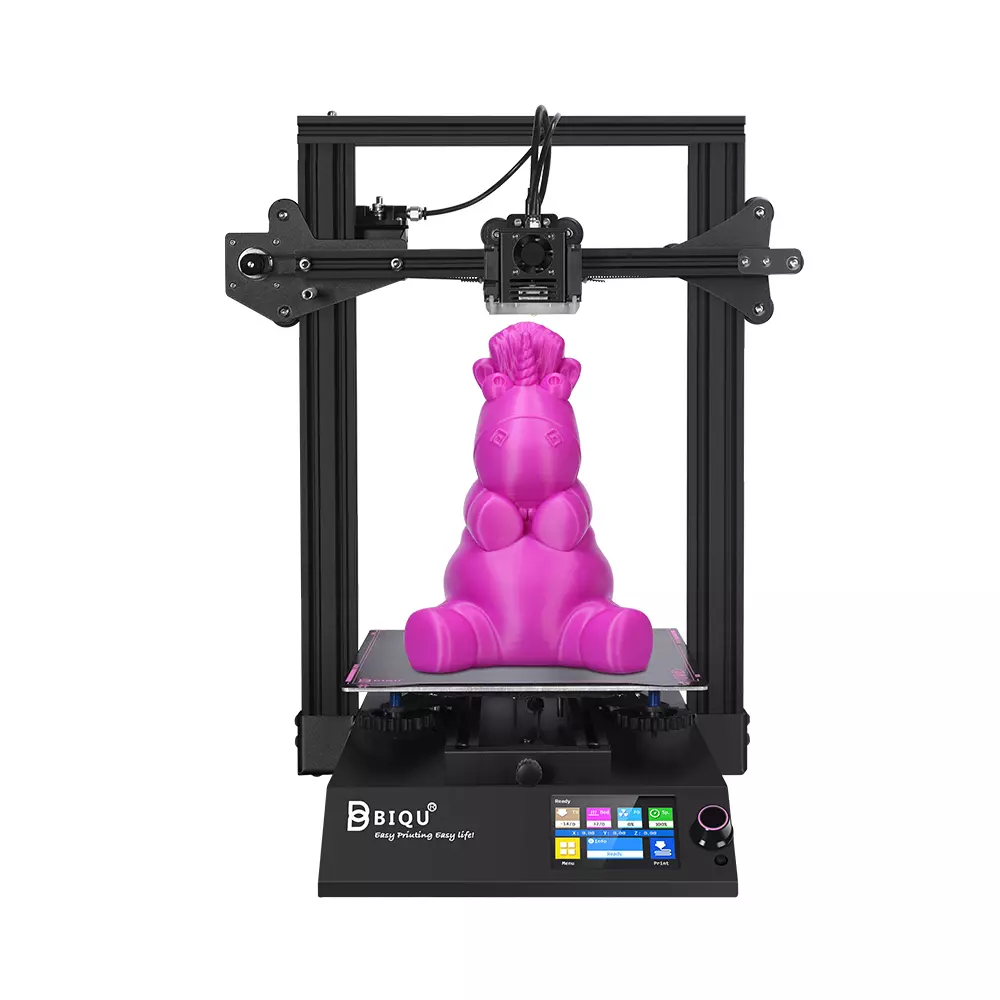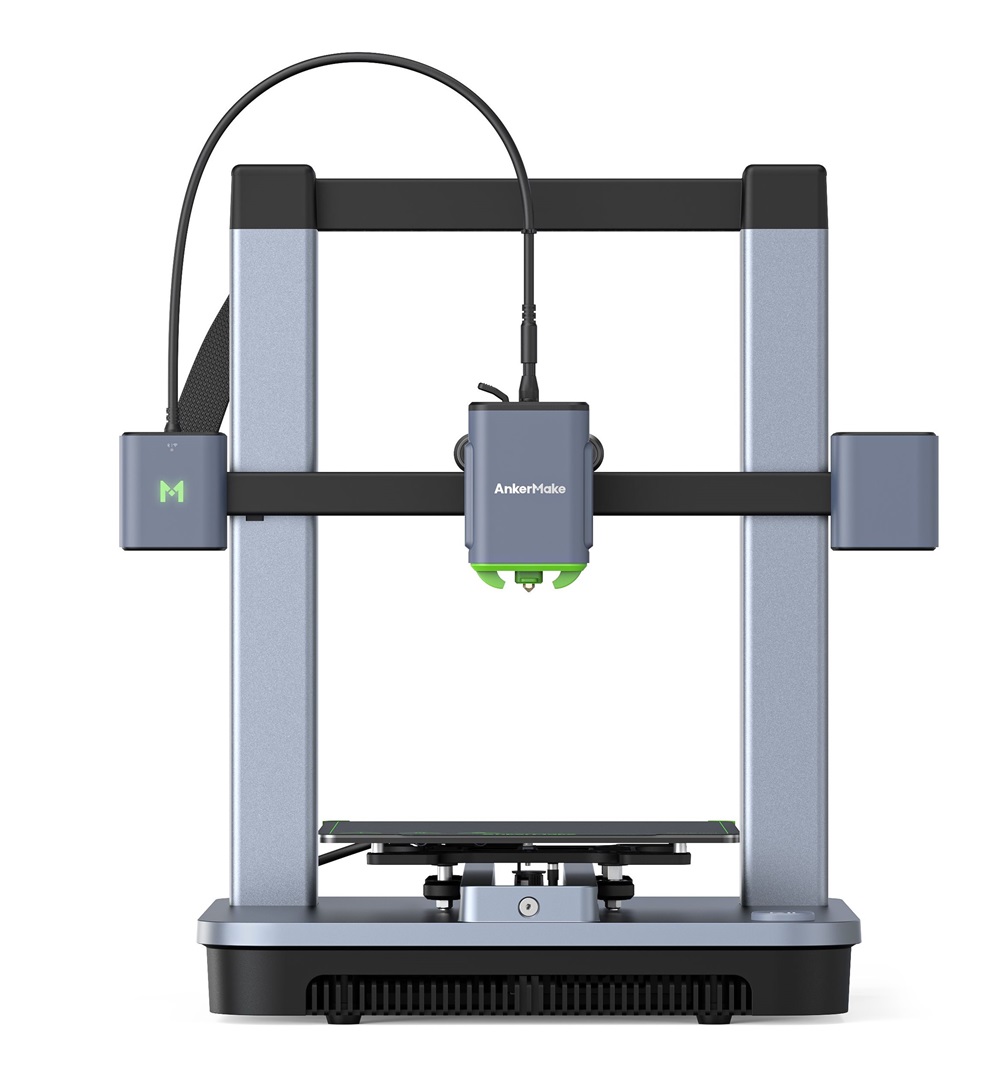Compare BIQU B1 vs M5C
Comparison between the best 3D printers
Choose the best 3D printer at the best price. The cheapest 3D printers are here.
Buy a 3D printer here with 3D Fila.
 |
 |
|
| Model | BIQU B1 |
M5C[BUY M5C] |
| Printing Material | Filament | Filament |
| Buy Filament for BigTreeTech BIQU B1 | Buy Filament forAnkerMake M5C | |
| Estimated price | $269,00 | $399,00 |
| Manufacturer | BigTreeTech | AnkerMake |
| Release Year | 2020 | 2023 |
| Print Volume [mm] | 235x235x270 | 220x220x250 |
| Printer Size [mm] | 412x402x492 | 466x374x480 |
| Weight [kg] | 8,00 | 9,6 |
| Power Loss Recovery | YES | YES |
| Enclosed printer | NO | NO |
| Bed Leveling | Manual | Automatic |
| Filament End Sensor | YES | YES |
| Bed type | Heated | Heated |
| Power supply system | Bowden | Direct Drive |
| Standard nozzle | 0,4 | 0,4 |
| Maximum Nozzle Temperature [°C] | 250 | 300 |
| Maximum Bed Temperature [°C] | 100 | 100 |
| Maximum printing speed [mm/s] | 100 | 500 |
| Filament holder | YES | YES |
| Camera for supervision | NO | NO |
| Recommended filaments | PLA, TPU, ABS, PETG | PLA, PETG, TPU, ABS, PA, PLA-CF, PETG-CF, PA-CF |
| Recommended slicers | Cura, Simplify, Slic3r | AnkerMake Studio (macOS, Windows), Simplify3D, Ultimaker Cura, PrusaSlicer |
| Maximum Resolution [mm] | 0,1 | 0,1 |
| Processor | 32 Bits BTT SKR V 1.4 | |
| Display | Touchscreen TFT 3,5'' | |
| Power Supply | 24V / 360W | 350 W |
| Connectivity | SD / USB | Wi-Fi, USB-C, Bluetooth |
| Operating systems | Windows, Mac, Linux | Windows, Linux e Macbook |
| Date of registration in the system | 2021-04-14 | 2024-09-11 |
| Release date | 2020 | 2023 |
| Extra features | The BIQU B1 is an advanced 3D printer with a silent 32-bit BTT SKR V1.4 motherboard and ARM Cortex-M3 CPU, offering DIY interfaces (I2C, SPI, WiFi) and dual Z-axis. Its dual BTT B1 TFT35 V3.0 operating system allows real-time monitoring and multiple printing modes, including G-code visualization effects. It stands out for its BIQU SSS (Super Spring Steel), ensuring easy model adhesion and simplified removal, with the possibility of using it on both sides. It includes a filament sensor, automatically pausing printing in case of filament breakage. The multicolored RGB lights integrated into the hotend allow you to view the printing status even at night. Additional notes include the need for a BIQU-specific Type-C cable and extra interfaces for smart filament sensor and BL Touch. | The AnkerMake M5 printer stands out for its impressive print speed, reaching up to 500mm/s. It features AI print monitoring, an integrated camera for creating timelapses, auto-leveling bed with pressure sensor, direct extruder, flexible PEI-coated build plate, and Wi-Fi and USB-C connectivity. Assembly is quick and easy, and the printer is designed to deliver high print quality and ease of use. |
| Support for multiple colors and materials (AMS and CFS) | NO | NO |
Notes * |
||
| Cost-benefit | 7 / 10 | 7 / 10 |
| Hardware | 2 / 10 | 3.2 / 10 |
| Tela | . | . |
| Print volume | 3 / 10 | 3 / 10 |
| Performance | 1 / 10 | 4 / 10 |
| [BUY M5C] |
Conclusion |
| In comparing the BIQU B1 and AnkerMake M5C 3D printers, several key factors highlight their strengths and weaknesses, guiding users towards the best choice based on individual needs and budget. The **BIQU B1**, priced more affordably, offers good value for users seeking an entry-level 3D printer with a generous print volume and essential features such as a filament end sensor and manual bed leveling. Its silent operation and dual Z-axis add to its appealing DIY aspect, making it suitable for hobbyists who enjoy tweaking and optimizing their setup. However, it falls short in automation, as it lacks features like automatic bed leveling and advanced connectivity options. In contrast, the **AnkerMake M5C** is a more modern option with a higher price tag, which reflects its enhanced capabilities. It boasts impressive print speeds, automatic bed leveling, and direct drive extruder technology, making it ideal for users who prioritize performance and ease of use. The inclusion of AI print monitoring and versatile connectivity options such as Wi-Fi and USB-C also cater to a more tech-savvy user base looking for a seamless printing experience. In conclusion, the choice between the two boils down to the user's specific requirements: the **BIQU B1** is suitable for budget-conscious individuals or those looking to gain experience in 3D printing, while the **AnkerMake M5C** is tailored for users willing to invest more for greater speed, ease of use, and advanced features. Each printer has its merits, making it essential to weigh the importance of cost, performance, and functionality before making a decision. |

